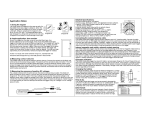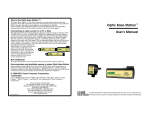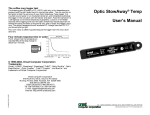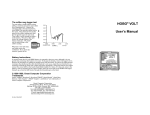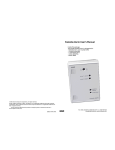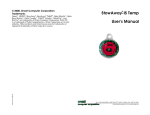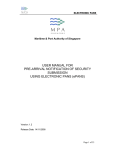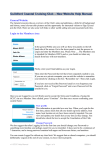Download StowAway TidbiT User`s Manual
Transcript
value and then jump to a higher value, recording that value for a while. The difference between the steps is twice the quantization error since a perfectly calibrated logger will never be more than half a step away from the actual value. Differences between loggers The calibration process adjusts the measured values of individual loggers with the same temperature range. This means that two loggers will not necessarily have the same step values, so that two loggers exposed to the same temperatures may report different values. Each one will be correct within its accuracy. The coffee mug logger test The freezing point of water is 0°C (+32°F) with only a tiny dependence on pressure and the salt levels found in normal tap water. You can use this information to test the accuracy of your StowAway TidbiT logger. Put crushed ice and water in an insulated container, and completely submerge the logger in the ice water. Place the container in a refrigerator to minimize temperature gradients. Leave it in for fifteen minutes while logging to be sure the TidbiT reaches equilibrium. Offload the data and blow up the end of your plot to check the logger’s accuracy. The actual temperature will be above 0°C, though less than 0.1°C if you do everything right. Five minute response time in water Plot D shows that the temperature reached 90% of the step change in about five minutes. In air moving 1m/sec, response time to reach 90% of the step change is typically 20 minutes. The logger is so small that you can fit a dozen of them in a coffee mug. Plot D Response Time StowAway® TidbiT® User’s Manual Thank you for purchasing a StowAway TidbiT temperature logger. The minimum optic logging system is comprised of these components: the StowAway TidbiT temperature logger, Optic Base Station, TidbiT Coupler, and logger software. Launch and recovery Launching your StowAway TidbiT Connect the Optic Base Station to the host computer using the appropriate interface cable (CABLE-PC-3.5 for a PC and CABLE-MAC-HOBO for a Macintosh). Place the StowAway TidbiT onto the TidbiT Coupler attached to the Optic Base Station. Refer to the Optic Base Station User’s Manual for proper alignment. Refer to the software user’s manual for launching procedures. Recommended software: BoxCar® 3.6+ or any version of BoxCar Pro. Triggered launch and the StowAway TidbiT The StowAway TidbiT has an optional triggered launch. Launch your logger choosing the triggered launch option. The magnetically operated reed switch is activated when the TidbiT Coupler is reconnected to the logger and then removed. The Optic Base Station and TidbiT Coupler are not necessary to trigger the launch. Any strong magnet placed near the face of the logger will trigger the launch. The StowAway Tidbit’s green LED light will flash brightly four times to indicate successful triggered launch. Seeing if the alarm has been tripped The StowAway TidbiT has two LEDs. The green LED blinks during use if it has not seen out-of-range conditions (see the software user’s manual for how to set the alarm). Note that the alarm can be set up to +70°C on the -20°C to +50°C TidbiT, but we recommend staying within the +50°C range of the logger. If it has recorded out-of-range conditions, the red LED will blink. When the StowAway TidbiT is full, neither LED will blink. The CE Marking identifies this product as complying with all relevant directives in the European Union (EU). © 1996–2011 Onset Computer Corporation. All rights reserved. Onset, HOBO, StowAway, TidbiT, and BoxCar are trademarks of Onset Computer Corporation. Onset Computer Corporation 470 MacArthur Blvd., Bourne MA 02532 Mailing: PO Box 3450 Pocasset MA 02559-3450 Telephone: 1-800-LOGGERS (564-4377) 508-759-9500 Fax: 508-759-9100 Email: [email protected] 4 Data recovery After the StowAway TidbiT has been launched, remove the logger from the TidbiT Coupler and deploy the logger. At the end of the deployment, reconnect the logger to the TidbiT Coupler attached to the Optic Base Station for readout. The StowAway TidbiT communicates at 1200 baud. The cleverly optimized software reads out 8K of data in 1.5 minutes, and 32K in 6 minutes. Sealed logger designed for field operation The StowAway TidbiT uses optical communication because it is completely sealed. This means that the logger can be used in wet or dirty locations or even completely submerged. The logger can be launched and readout directly to a host computer using the TidbiT Coupler, the Optic Base Station, and the appropriate interface cable. Data can also be readout in the field with the Optic Shuttle, Onset’s unique field data transporter. For data retrieval be sure to clean your logger of dirt and dust. To clean your TidbiT use only a non-abrasive mild soap and warm water with a non-scratching sponge or cloth. Any scratches or abrasions on the TidbiT's surface may impair communication. (For tougher cleaning jobs use a plastic polish such as Novus® plastic polish.) 3050-J MAN-TBI32 Hardware details Accuracy of two different temperature ranges Time accuracy At room temperature, the logger’s idea of time can vary from the actual time by as much as one hour per year (100 ppm). There is an additional temperature effect shown in Plot A. Depth: rated to 1000 feet Just for fun, we tested the StowAway TidbiT at really high pressures. Although they worked at 5000 psi (10,000 ft water depth equivalent) we are not prepared to test all of them to this depth. We allowed a conservative factor of 10, rating them to 1000 ft. Graph 1093 Timebase dependence Plot A Temperature accuracy and resolution The StowAway TidbiT logger’s accuracy and resolution specifications are given in plot B and plot C. The logger’s accuracy specification is its maximum measurement error, including the effects of thermistor error and quantization error. In most cases the logger’s actual accuracy is better than the specified value. The logger’s resolution is the difference between temperature steps. Model TBI32-05+37: Range -4°C to 37°C (24°F to 99°F)*; Model TBI32-20+50: Range -20°C to50°C (-40°F to 122°F) Plot B: Graph 4029-B Temperature/Accuracy Model TBI32 (-20°C to +50°C) Operating temperature range -20°C to +50°C The StowAway TidbiT will operate properly in the temperature range -20°C to +50°C. It will record temperatures up to +70°C but exposure to temperatures above +50°C or below -20°C will reduce the battery life. For temperatures above the highest value in its range, it will read its highest value, and for temperatures below the lowest value in its range, it will read its lowest value. *Specified range is narrower than nominal range due to precision calibration process. Notice: To guarantee specified accuracy, the TidbiT and Optic StowAway units should not be used in condensing environments and water temperatures higher than +30°C (+86°F) for more than eight weeks cumulatively. Prolonged exposure will lead to measurement drift and eventual failure. If your application temperatures and environment are questionable based on the above statement, please contact Onset or your authorized Onset dealer for more information. Individual calibration Factors that affect the StowAway TidbiT’s accuracy are the thermistor error, component imperfections (resistor variations and A-D nonlinearities), and quantization error (difference between temperature steps). Most StowAways use thermistors with a 0.2°C interchangeability in the range 0°C to +75°C. The StowAway TidbiT model TBI32 -05+37, uses a thermistor that has 0.1°C interchange ability. Onset Computer Corporation’s proprietary test procedures effectively eliminate the resistor and A-D errors, leaving only the thermistor error, quantization error, and a small residual calibration error. Five year battery life The StowAway Tidbit has a five-year battery life in typical use. This corresponds to 16 three-month deployments in water (+35°F to +80°F) with 4 minute or longer intervals, no multiple sampling and one offload per deployment. Alternatively, if the logger is used constantly in short duration applications, the battery life can be substantially reduced. Examples of the battery life in short deployments are: 6,000 one-hour deployments with no multiple sampling, 5,000 two-hour deployments with no multiple sampling, and 70 four-day deployments with multiple sampling. Sampling intervals shorter than 1 minute and/or extended storage or deployment above +80°F will significantly reduce battery life. The battery is not replaceable. 1.2 x 1.6 x 0.63 inches and 0.68 oz The shape of the StowAway TidbiT was chosen to minimize the logger’s volume. The thermistor has been placed on the PC board in the logger to provide enhanced protection for the sensor and further improve the already high reliability of these loggers. The logger weighs 0.68 oz. (19.5 g) and is negatively buoyant. The TidbiT will measure temperature in the grey area, but exposure to temperatures in this range will reduce the TidbiT’s battery life. The blinking LEDs Waiting for trigger: Weak green blink every six seconds. Waiting out delay: Weak green blink every four seconds. Logging: Bright green blink every measurement, and weak every two seconds between measurements. If the StowAway TidbiT is in multiple sampling mode, it will blink at each measurement, not each time data is recorded. Alarm: A logger is out-of-range if it has recorded a value that is above the high alarm limit or below the low alarm limit. The red LED will blink during the duration of the deployment instead of the green LED. What is quantization error? Ideally a logger would record a different temperature for each temperature applied to it. The StowAway TidbiT can store only 255 different temperature values in its temperature range. If you exposed the logger to a slowly rising temperature, the logger would record a constant 2 Plot C: Graph 4024 Temperature/Accuracy Model TBI (-5°C to +37°C) 3



